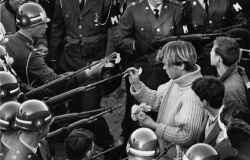Difference between revisions of "Nonviolence"
(non-violent extremism) |
|||
| (One intermediate revision by one other user not shown) | |||
| Line 2: | Line 2: | ||
|wikipedia=https://en.wikipedia.org/wiki/Non_violence | |wikipedia=https://en.wikipedia.org/wiki/Non_violence | ||
|constitutes= | |constitutes= | ||
| − | |image=flower power.jpg | + | |image=flower power.jpg |
|image_caption="Flower Power", an iconic photo taken at the Mall Entrance of the Pentagon | |image_caption="Flower Power", an iconic photo taken at the Mall Entrance of the Pentagon | ||
| + | |wikiquote=http://en.wikiquote.org/wiki/Nonviolence | ||
}} | }} | ||
'''Nonviolence''' is the principled refusal to use violence to achieve ones objectives. It is a common strategy of [[war resistance]] and the campaign against the [[arms trade]]. | '''Nonviolence''' is the principled refusal to use violence to achieve ones objectives. It is a common strategy of [[war resistance]] and the campaign against the [[arms trade]]. | ||
| Line 23: | Line 24: | ||
|source_name=International Centre for Counter-Terrorism | |source_name=International Centre for Counter-Terrorism | ||
}} | }} | ||
| + | |||
| + | ==Killing of non-violent citizens by Saudi Arabia== | ||
| + | [[Saudi Arabia]] is reported to have killed 48 people in the first 4 months of 2018, half for non-violent [[drug]] charges. Human Rights Watch stated that the kingdom had a “notoriously unfair criminal justice system”.<ref>https://www.theguardian.com/world/2018/apr/26/saudi-arabia-criticised-over-executions-for-drug-offences</ref> | ||
| + | |||
{{SMWDocs}} | {{SMWDocs}} | ||
| − | |||
==References== | ==References== | ||
{{reflist}} | {{reflist}} | ||
Revision as of 12:51, 28 April 2018
 "Flower Power", an iconic photo taken at the Mall Entrance of the Pentagon | |
| Interest of | • James Douglass • Otpor! |
Nonviolence is the principled refusal to use violence to achieve ones objectives. It is a common strategy of war resistance and the campaign against the arms trade.
Contents
Advocates
Famous advocates of nonviolence include Gandhi and Martin Luther King.
"Non-violent extremism"
- Full article: “Non-violent extremism”
- Full article: “Non-violent extremism”
In 2005, the phrase "extremism" was introduced as an alternative to "terrorist". In January 2011, the phrase "non-violent extremism". In 2014, Alex Schmid at the International Centre for Counter-Terrorism published a research paper that argued that the distinction between “violent [Muslim] extremism” and “non-violent [Muslim] extremism” is not a valid one. He concludes that “preventing violent extremism is not enough; rather all extremism – Islamist and other – ought to be prevented, given the bloody track record of extremism in power in the twentieth century and beyond. Rather than distinguishing between non-violent and violent extremists, we should distinguish between extremists and non-extremists and support the latter against Islamists at home and abroad. Governments should challenge and resist all extremism, whether it is violent or not, whether it is Islamist or not.” [1]
Killing of non-violent citizens by Saudi Arabia
Saudi Arabia is reported to have killed 48 people in the first 4 months of 2018, half for non-violent drug charges. Human Rights Watch stated that the kingdom had a “notoriously unfair criminal justice system”.[2]
Examples
| Page name | Description |
|---|---|
| Diplomacy | |
| Nonviolent Communication |
Related Quotations
| Page | Quote | Author |
|---|---|---|
| Mahatma Gandhi | “I am prepared to die, but there is no cause for which I am prepared to kill. I object to violence because when it appears to do good, the good is only temporary; the evil it does is permanent. Strength does not come from physical capacity. It comes from an indomitable will.” | Mahatma Gandhi |
| RAND/Terrorism Chronology Database | “Since the RAND-St Andrews chronology only records those incidents that are ‘international’, the database is orientated towards the recording of attacks on foreign visitors to, and military occupiers of, relatively poor countries. By definition those victims are normally business representatives and military personnel from economically strong, normally Western, nations. The second observation, which reinforces this latter point, is that the Chronology explicitly excludes acts of state terror committed by any government against its own citizens, and acts of violence occurring in war or in war-like situations. Incidents involving Western armies of occupation and businesses are included in the Chronology only where they are victims rather than the perpetrators of violence. Third, some of the methodological inconsistencies in the use of data in the Chronology database are reminiscent of the counter-insurgency position. It is possible to find non-violent activities and protests against state violence recorded in the database as "terrorism."” | Jonny Burnett Dave Whyte |